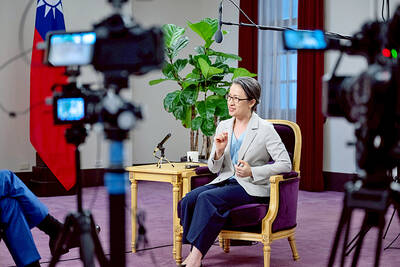Taipei EasyCard Corp yesterday signed a contract with four banks to issue EasyCard joint-branded cards that will allow cardholders to link their EasyCard with credit or ATM accounts to add value automatically as soon as October.
Taipei EasyCard Corp chairman Sean Lien (連勝文) said at a press conference yesterday that along with the four banks — including E. Sun Bank, Mega International Commercial Bank, First Commercial Bank and Hua Nan Bank — the corporation would help expand use of EasyCards and provide more benefits to cardholders.
The company had already cooperated with four other banks in issuing the joint-branded card three years ago.
Lien attributed the expanded cooperation with the banks to the passing of the Act on Issuance and Management of Electronic Monetary Cards (電子票證發行管理條例) on Tuesday, and said he expected to take advantage of more business opportunities in the future.
The Act allows companies to issue a single electronic monetary card that can be used for multiple purposes.
Cardholders will be able to pay for products, services or government fees with the card.
Jason Lin (林志盈), general manager of the company, said it has been putting a great deal of effort into expanding use of EasyCards since the law was passed.
In addition to allowing the card to be used to pay for products at major convenience stores in June, cardholders will be able to link their EasyCard with credit card accounts in October and with ATM cards next year.
The “account link” service will allow cardholders to add value to their EasyCard automatically.
People who are prohibited from applying for credit cards, such as students under age 20 can also utilize the service by linking their EasyCard to the credit card account of a legal guardian, Lin said.
The “automatic add value” service limits the amount of money that can be added to a card to NT$500 per day.

China might accelerate its strategic actions toward Taiwan, the South China Sea and across the first island chain, after the US officially entered a military conflict with Iran, as Beijing would perceive Washington as incapable of fighting a two-front war, a military expert said yesterday. The US’ ongoing conflict with Iran is not merely an act of retaliation or a “delaying tactic,” but a strategic military campaign aimed at dismantling Tehran’s nuclear capabilities and reshaping the regional order in the Middle East, said National Defense University distinguished adjunct lecturer Holmes Liao (廖宏祥), former McDonnell Douglas Aerospace representative in Taiwan. If

TO BE APPEALED: The environment ministry said coal reduction goals had to be reached within two months, which was against the principle of legitimate expectation The Taipei High Administrative Court on Thursday ruled in favor of the Taichung Environmental Protection Bureau in its administrative litigation against the Ministry of Environment for the rescission of a NT$18 million fine (US$609,570) imposed by the bureau on the Taichung Power Plant in 2019 for alleged excess coal power generation. The bureau in November 2019 revised what it said was a “slip of the pen” in the text of the operating permit granted to the plant — which is run by Taiwan Power Co (Taipower) — in October 2017. The permit originally read: “reduce coal use by 40 percent from Jan.

‘SPEY’ REACTION: Beijing said its Eastern Theater Command ‘organized troops to monitor and guard the entire process’ of a Taiwan Strait transit China sent 74 warplanes toward Taiwan between late Thursday and early yesterday, 61 of which crossed the median line in the Taiwan Strait. It was not clear why so many planes were scrambled, said the Ministry of National Defense, which tabulated the flights. The aircraft were sent in two separate tranches, the ministry said. The Ministry of Foreign Affairs on Thursday “confirmed and welcomed” a transit by the British Royal Navy’s HMS Spey, a River-class offshore patrol vessel, through the Taiwan Strait a day earlier. The ship’s transit “once again [reaffirmed the Strait’s] status as international waters,” the foreign ministry said. “Such transits by

Taiwan is doing everything it can to prevent a military conflict with China, including building up asymmetric defense capabilities and fortifying public resilience, Vice President Hsiao Bi-khim (蕭美琴) said in a recent interview. “Everything we are doing is to prevent a conflict from happening, whether it is 2027 or before that or beyond that,” Hsiao told American podcaster Shawn Ryan of the Shawn Ryan Show. She was referring to a timeline cited by several US military and intelligence officials, who said Chinese President Xi Jinping (習近平) had instructed the Chinese People’s Liberation Army to be ready to take military action against Taiwan